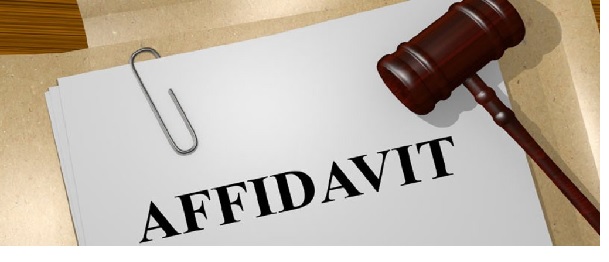What is an Affidavit?
An affidavit is a written or printed document that declares or states facts, voluntarily provided by the party and taken before a person authorized by law to administer such an oath or confirmation. Facts in an affidavit are confirmed by the oath.
Here are details you must know about an Affidavit in Nigeria
Before an affidavit is used in any Nigerian court for any purpose, the original document must be filed in the court. Only the original or office copy can be recognized for any purposes.
Any affidavit sworn before any judge, officer or other authorized persons can be used in the court in all cases where an affidavit is needed.
An affidavit must be signed under the authority of a court judge, magistrate or any other officer authorized to administer oaths.
Any affidavit sworn in any other country before an authorized person such as:
a judge or magistrate, and authenticated by the official seal of the notary public or court,
a duly authorized officer in the Nigerian Embassy, High Commission or Consulate in that country,
can be used in court in all cases where affidavits are admissible.
As long as an affidavit has the seal or signature of a court, judge, magistrate or another officer, it is considered authentic and can be presented in any court.

Types of Affidavits
Affidavits of facts: This is an affidavit filed to bring facts to the attention of a court for authorization
Affidavits that verify the loss of documents or other property
Affidavits for a change of name: This is used to declare a change of name
Affidavit showing declaration of age in place of a birth certificate
Affidavits that verify good conduct
Affidavit which state facts in support of cases in court: This is a written deposition on oath in support of cases in court
Affidavits that verify the loss of vital documents such as birth certificate, death certificate, shares certificate, drivers’ license, vehicle particulars, Identity cards, etc.
Authorized Persons to Issue and Swear Affidavits in Nigeria
Below is a list of people authorized to issue and swear affidavits in Nigeria:
Chief Justice of Nigeria
Justices of the Supreme Court of Nigeria
President and Justices of the Court of Appeal
Judges of the Federal High Court
Notaries Public
Commissioners for Oaths: These are court officials (court registrars) who are not below grade 7 and designated to administer oaths.
Authorized Persons to Issue and Swear Affidavits at the State level
At the state levels in Nigeria, affidavits used for court proceedings can be issued by the following categories of persons:
The Chief Judge of the State
Judges of the High Court (of the state)
Magistrates
Notaries Public
Commissioners for Oaths (Court officials)
The rules and procedures as well as the authorized officials before whom affidavits and oaths may be received are uniform in all Nigerian states.
Affidavits for Non-Court Proceedings, otherwise known as Private or Personal Affidavits
Private or personal affidavits are those affidavits that are not used in judicial proceedings. A Commissioner for Oaths and a Notary Public are authorized to swear and issue private affidavits (used in non-court proceedings)
How to get an Affidavit in Nigeria
According to the Nigerian constitution, below are requirements to obtain an Affidavit:
An affidavit must be signed by the deponent when sworn. If he or she cannot write or is blind, it must be marked by him personally in the presence of the Commissioner for Oaths.
Deponents to an affidavit must appear in person before a Commissioner for Oaths
Deponents to an affidavit are required to state their full name, trade, profession, residence, and nationality
The procedure to obtain a sworn affidavit is as follows:
The deponent (person who wants to swear an affidavit) will approach either a Commissioner for Oaths at the court or a notary public. Note: Affidavits for court proceedings are sworn by a Commissioner for Oaths.
The deponent is required to pay the requisite fee and is issued a receipt. Note: An affidavit sworn at a court will always be given a receipt.
The notary or Commissioner for Oath must verify the identity of the deponent by checking a passport or national ID card
The Commissioner for Oaths or Notary must verify the facts of the deponent’s statement by asking questions and requesting the deponent to present any other evidence to ascertain the facts
The deponent will then swear to the information and sign the affidavit
The Commissioner for Oaths or Notary is required to sign and seal the affidavit
In summary, affidavits are obtained by simply affirming the contents in the presence of the authorized officials. The deponent goes to the court registry for swearing.
Security Features on Court-Issued Affidavits
Although there are no security features on an affidavit and it is almost impossible to determine the authenticity of a document right on the spot, there are certain elements that you can check on an affidavit to know if it is genuine or not.
An affidavit will include the following:
The signature of the deponent
The signature of the Commissioner for Oaths/Notary that swore the document
The seal/stamp of the court/Notary
Every court has its own rubber or plastic seal used on court-issued affidavits. The Commissioner for Oaths will affix the seal of the court to the affidavit, and sign his name at its bottom.
Notary Public-issued affidavits include the following:
The stamp of the notary that issued the affidavit
A seal and the name of the Notary Public
Supreme Court enrolment number
This article has provided you with information on how to obtain an affidavit, the authorized persons involved in swearing an affidavit and other requirements to obtain an affidavit in Nigeria.